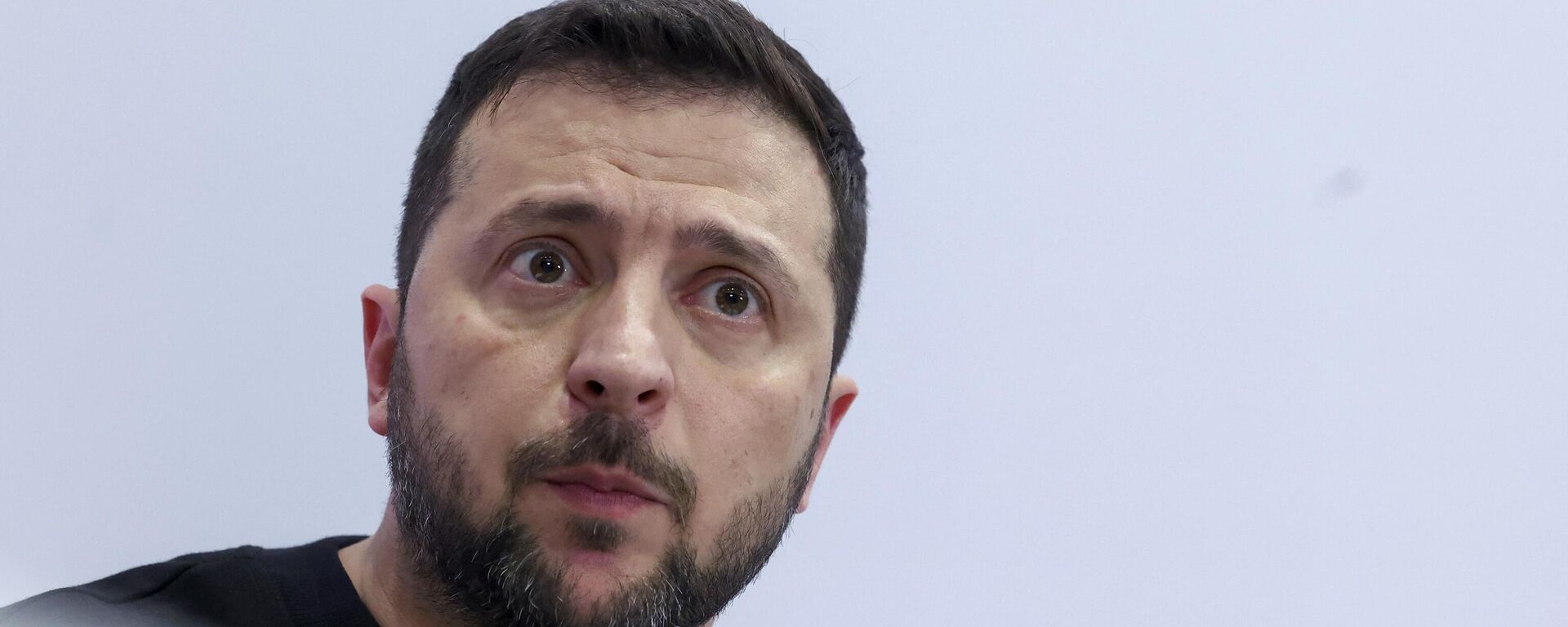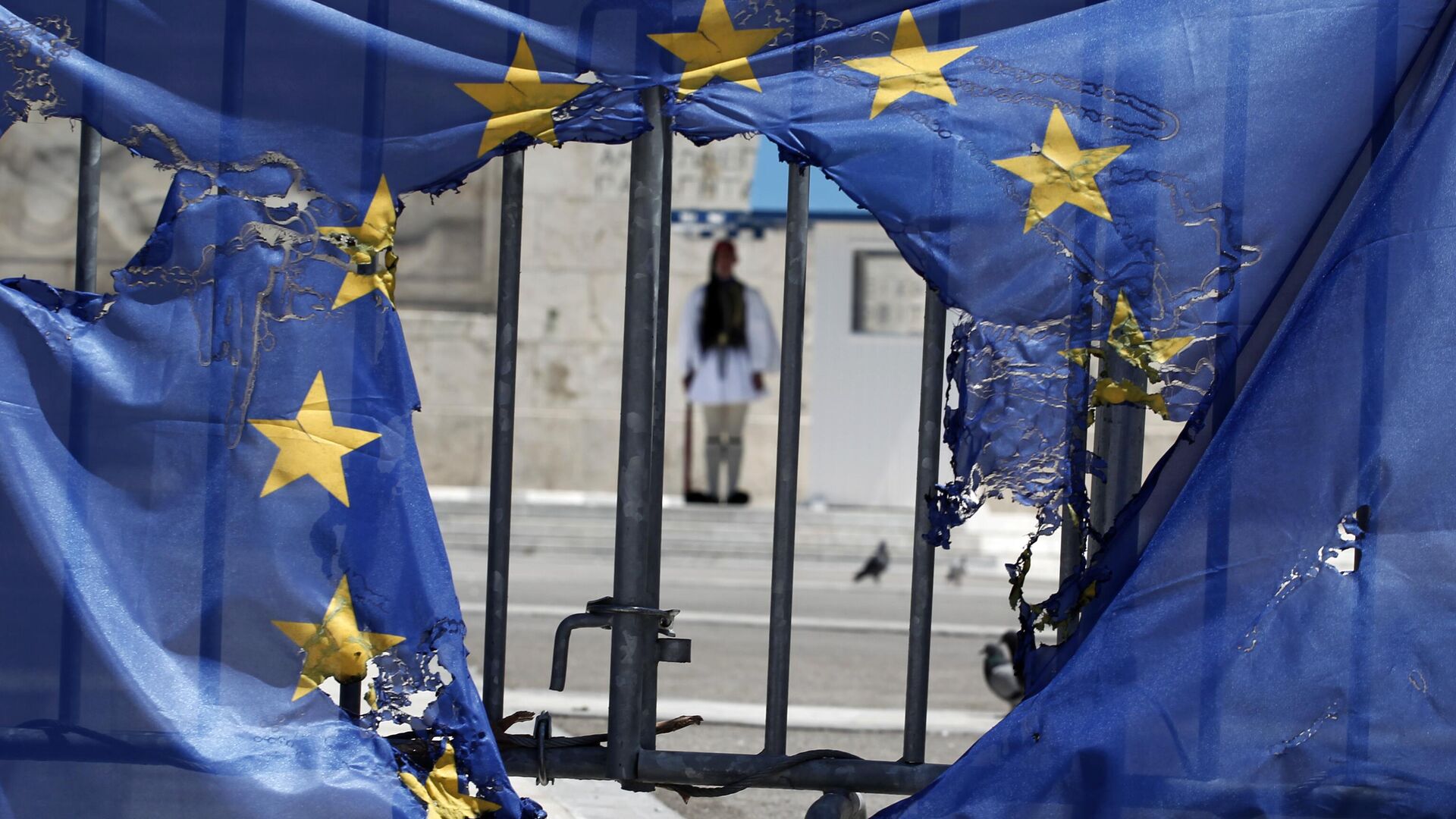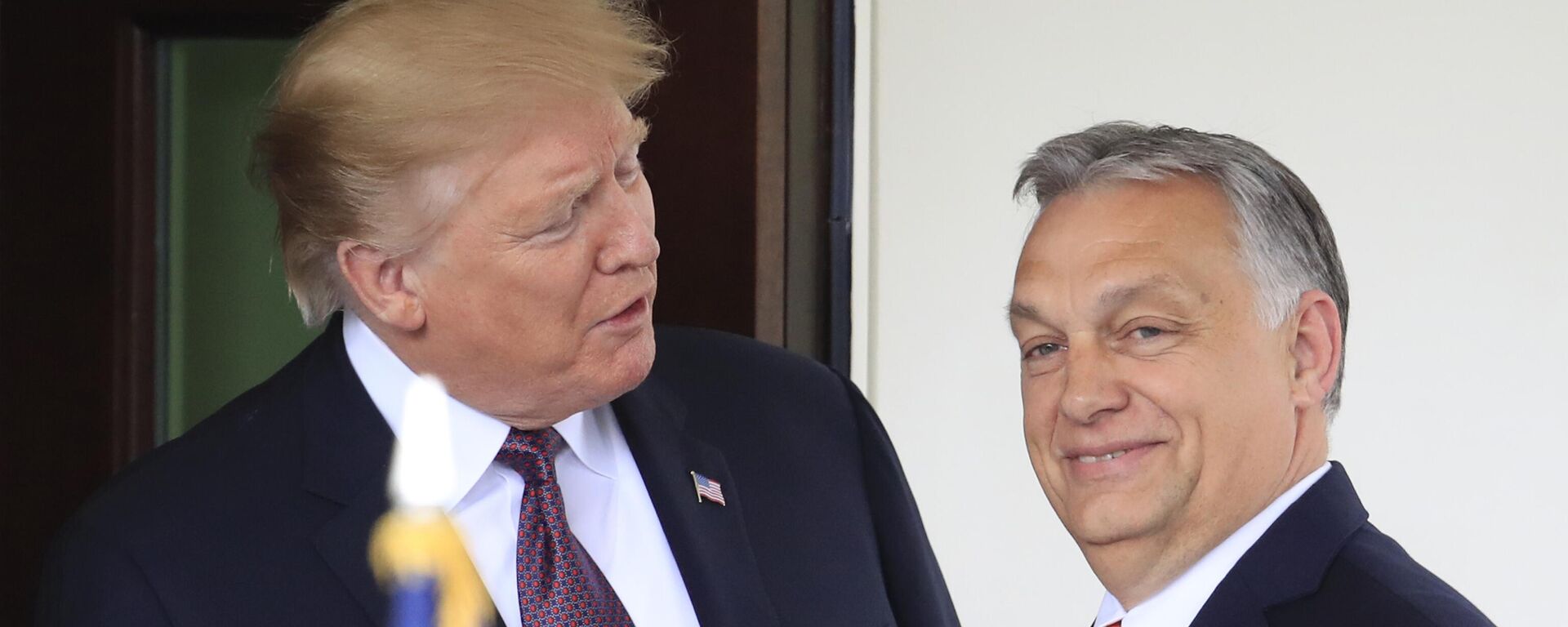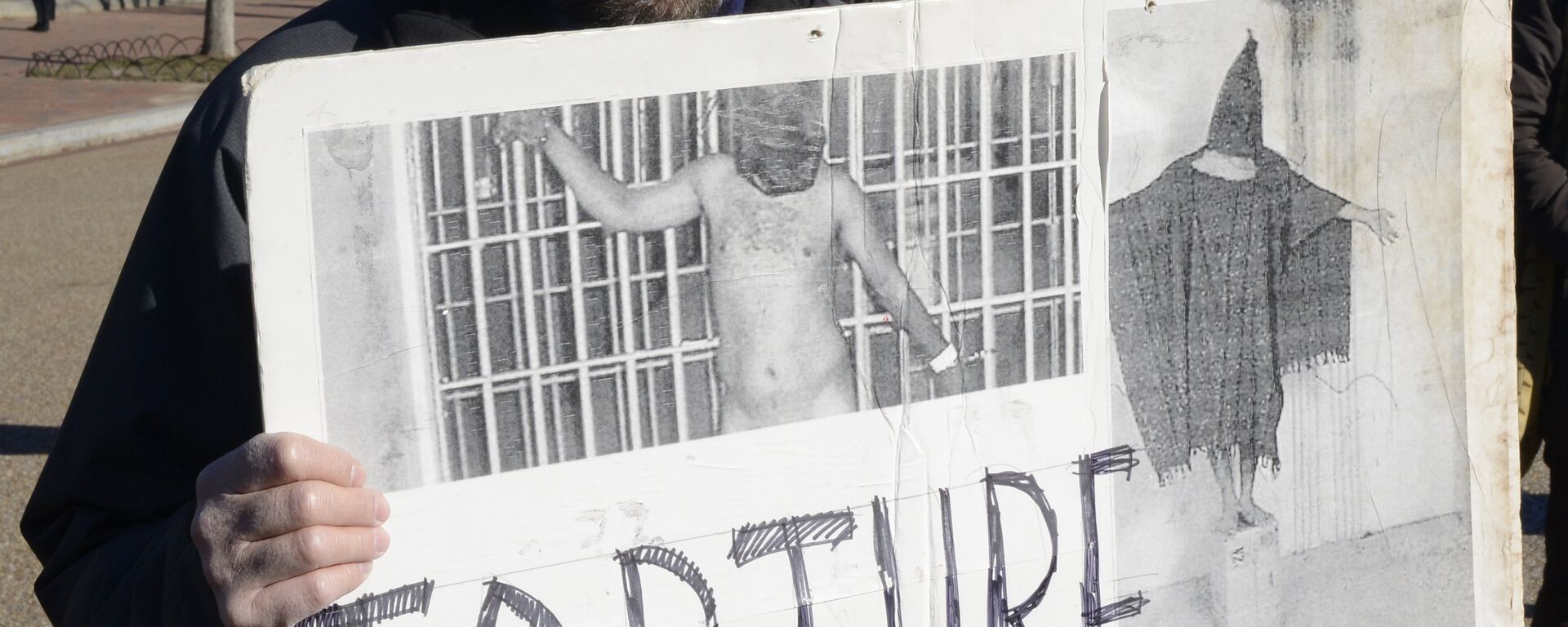https://sputnikglobe.com/20240308/european-vassal-states-mull-arms-production-as-biden-leads-continent-to-destruction-1117198145.html
European Vassal States Mull Arms Production as Biden Leads Continent to Destruction
European Vassal States Mull Arms Production as Biden Leads Continent to Destruction
Sputnik International
As Europe suffers economically from the US-backed proxy war in the Donbass, will its leaders find the courage to question decades of anti-Russia hysteria?
2024-03-08T00:08+0000
2024-03-08T00:08+0000
2024-03-08T00:08+0000
europe
volodymyr zelensky
elijah j. magnier
joe biden
ukraine
russia
nato
cia
fault lines
arms production
https://cdn1.img.sputnikglobe.com/img/07e8/02/0f/1116792375_0:160:3072:1888_1920x0_80_0_0_5adf8600a8dbf2d82997688574f8db15.jpg
The United States’ proxy war in Ukraine has brought Europe to a state of crisis. As sanctions on Russian gas push energy costs sky high, German industry has taken a hit as manufacturing has become unsustainable. A flood of Ukrainian migrants has also taxed countries' social systems, creating controversy as refugees are granted housing that’s increasingly unaffordable to average people.Now a full-scale collapse in Ukraine threatens to discredit politicians who bet everything on arming the country, with anti-establishment parties poised to benefit.International affairs analyst Elijah Magnier has observed these developments with disbelief from his home in France, where controversial President Emmanuel Macron recently faced criticism for advocating even deeper European involvement in Kiev’s failing effort. The journalist joined Sputnik’s Fault Lines program on Thursday to sound off on the madness of the EU’s political class.“It seems that Europe is freaking out,” said host Jamarl Thomas. “Because they know in more detail how bad Ukraine is doing on the battlefield. It seems like they're worried about a general collapse at this point.”Zelensky, observing Zaluzhny’s popularity, ousted him from his position as top commander of Ukraine’s military, a move that reportedly drew opposition from the Biden Administration. Presidential elections set for later this month were canceled as Ukraine extends a period of martial law. Zelensky’s strongarm tactics, which have also included the forced dissolution of opposition political parties and closure of media outlets, have generated broad criticism.“In my experience in a war zone and the aftermath of the war, all leaders fall, including General Charles de Gaulle after the Second World War,” noted Magnier. “Then they wake up and say ‘what is left of our country?’ That is going to be the major question for Ukraine.”“And then to acknowledge that Russia has won over the 50 united countries under the banner of the United States in Germany, that is going to tremble the earth and all of the European and the Western bloc.”The proposal has proven highly controversial, with observers pointing out the continent’s atrophied arms production capabilities would struggle to meet Ukraine’s needs. Additionally, Europe is already facing economic challenges amidst high inflation and deindustrialization. Politicians are hesitant to invest resources towards military concerns, which would likely require the issuance of bonds.“Joe Biden is more soft on not really voicing what he's doing with the Europeans,” he explained. “But he's doing exactly the same as any other president - putting America first.”The United States has long offered Europe military protection under the aegis of the North Atlantic Treaty Organization (NATO). But along with the guarantee of the alliance’s nuclear umbrella has come a degree of political coercion.Italy was rocked by decades of open warfare between the US-supported paramilitaries and left-wing groups, with bombings and massacres frequently making headlines. An Italian parliamentary commission found the violence was part of a CIA-backed “strategy of tension” designed to discredit the Italian Communist Party, which enjoyed widespread popularity as a result of its leading role in opposing Benito Mussolini. The United States also worked to undermine the Italian left via a covert media campaign, ensuring European democracy remained within the narrow parameters deemed acceptable by leaders in Washington.In Italy, as in neighboring France, the Communist Party was a major force in politics amidst proposals to strengthen the welfare state after the collective sacrifice of World War II. Both parties charted a course independent from Moscow, proposing a peaceful "road to socialism" by democratic means. But fear of Russia proved useful in reorienting European politics back towards the center. When Cold War hysteria proved insufficient in reshaping the democratic landscape, US intelligence stepped in to help mold public opinion.“Today, what's happening in Europe is leaders are thinking why we need to think in the belligerent approach towards our neighbor,” concluded Magnier, noting that opposition leaders are challenging the long-held hostility towards Moscow promoted by the US. “Because Russia is part of the European continent.”As the saying goes, political power flows from the barrel of a gun. As long as Europe is dependent on outside powers for security, it will never be fully sovereign, and the fixations of Washington will become the neuroses of Brussels.
https://sputnikglobe.com/20240215/trust-in-zelensky-down-5-percentage-points-in-ukraine-after-zaluzhnys-dismissal---poll-1116807089.html
https://sputnikglobe.com/20240306/orban-to-discuss-with-trump-prospects-of-peace-in-ukraine---foreign-minister-1117153281.html
https://sputnikglobe.com/20160505/torture-bush-obama-cia-rendition-1039099993.html
ukraine
russia
italy
Sputnik International
feedback@sputniknews.com
+74956456601
MIA „Rossiya Segodnya“
2024
John Miles
https://cdn1.img.sputnikglobe.com/img/07e8/01/19/1116388787_0:0:1316:1316_100x100_80_0_0_77e70d36afd983012b1c5d38ddb84156.jpg
John Miles
https://cdn1.img.sputnikglobe.com/img/07e8/01/19/1116388787_0:0:1316:1316_100x100_80_0_0_77e70d36afd983012b1c5d38ddb84156.jpg
News
en_EN
Sputnik International
feedback@sputniknews.com
+74956456601
MIA „Rossiya Segodnya“
Sputnik International
feedback@sputniknews.com
+74956456601
MIA „Rossiya Segodnya“
John Miles
https://cdn1.img.sputnikglobe.com/img/07e8/01/19/1116388787_0:0:1316:1316_100x100_80_0_0_77e70d36afd983012b1c5d38ddb84156.jpg
europe arms production, europe economic crisis, ukraine lost, us leading europe, us influence in europe, us political influence in europe, joe biden europe, donald trump europe, nato europe, operation gladio, lears of lead, italy years of lead, nato influence in europe, cia influence in europe, ukraine crisis, ukrainian conflict, money to ukraine
europe arms production, europe economic crisis, ukraine lost, us leading europe, us influence in europe, us political influence in europe, joe biden europe, donald trump europe, nato europe, operation gladio, lears of lead, italy years of lead, nato influence in europe, cia influence in europe, ukraine crisis, ukrainian conflict, money to ukraine
European Vassal States Mull Arms Production as Biden Leads Continent to Destruction
As Europe suffers economically from the US-backed proxy war in the Donbass, will its leaders find the courage to question decades of anti-Russia hysteria?
The United States’ proxy war in Ukraine has brought Europe to a state of crisis. As sanctions on Russian gas push energy costs sky high, German industry has taken a hit as manufacturing has become unsustainable. A flood of Ukrainian migrants has also taxed countries' social systems, creating controversy as refugees are granted housing that’s increasingly unaffordable to average people.
Now a full-scale collapse in Ukraine threatens to discredit politicians who bet everything on arming the country, with anti-establishment parties poised to benefit.
International affairs analyst Elijah Magnier has observed these developments with disbelief from his home in France, where controversial President Emmanuel Macron recently faced criticism for advocating even deeper European involvement in Kiev’s failing effort. The journalist joined
Sputnik’s Fault Lines program on Thursday to sound off on the madness of the EU’s political class.
“It seems that Europe is freaking out,” said host Jamarl Thomas. “Because they know in more detail how bad Ukraine is doing on the battlefield. It seems like they're worried about a general collapse at this point.”
“It seems to be a general collapse on some level with Ukraine doing everything in their power basically just to hold ground and them not being able to do so,” he continued. “From the internal polling itself, [Ukrainian President Volodymyr Zelensky] is not doing great in regard to the way the Ukrainians are seeing him as a leader. And if they were given the option, they would pick [former Ukrainian armed forces commander Valery] Zaluzhny.”
Zelensky, observing Zaluzhny’s popularity, ousted him from his position as top commander of Ukraine’s military, a move that reportedly drew opposition from the Biden Administration. Presidential elections set for later this month were canceled as Ukraine extends a period of martial law. Zelensky’s strongarm tactics, which have also included the forced dissolution of opposition political parties and closure of media outlets, have generated broad criticism.

15 February 2024, 19:15 GMT
“In my experience in a war zone and the aftermath of the war, all leaders fall, including General Charles de Gaulle after the Second World War,” noted Magnier. “Then they wake up and say ‘what is left of our country?’ That is going to be the major question for Ukraine.”
“And the more challenging one is for the Western bloc to acknowledge its defeat,” added the veteran war correspondent, who reported from the ground in Iran, Lebanon, Syria, Iraq, Libya, Sudan, Afghanistan and Yugoslavia. “We are talking about 50 nations gathered together in one place in Ramstein, Germany – planning, organizing, supporting with intelligence, logistics, money, military support, men – everything to defeat Russia.”
“And then to acknowledge that Russia has won over the 50 united countries under the banner of the United States in Germany, that is going to tremble the earth and all of the European and the Western bloc.”
Recently, European politicians have moved to shoulder the cost of assistance to Kiev as Republicans in Congress have balked at continued aid for the country. The Donbass Conflict has generated a bonanza for US weapons manufacturers who have worked to replenish American stockpiles drained by the war. But political gridlock in the United States has led Europeans to mull domestic arms production.
The proposal has proven highly controversial, with observers pointing out the continent’s atrophied arms production capabilities would struggle to meet Ukraine’s needs. Additionally, Europe is already facing economic challenges amidst high inflation and deindustrialization. Politicians are hesitant to invest resources towards military concerns, which would likely require the issuance of bonds.
“There is a real panic in Europe, but there is not enough intelligence to say 'we've lost the war and we stop now,’” said Magnier. “I think that is due to the presidential elections in the United States, where they don't want to be seen as the one that created the failure of Joe Biden in the coming election because they are terrified of [former US President Donald] Trump coming and dictating his policy overtly and embarrassing them.”
“Joe Biden is more soft on not really voicing what he's doing with the Europeans,” he explained. “But he's doing exactly the same as any other president - putting America first.”
The United States has long offered Europe military protection under the aegis of the North Atlantic Treaty Organization (NATO). But along with the guarantee of the alliance’s nuclear umbrella has come a degree of political coercion.
NATO and the US Central Intelligence Agency (CIA) funded and organized clandestine “stay behind” militias throughout Europe during the 20th century as part of a secret effort known as Operation Gladio. The paramilitary groups were ostensibly designed to offer resistance in the event of a Soviet invasion. But evidence has implicated the right-wing militias in various acts of terrorism and assassination throughout the continent.
Italy was rocked by decades of open warfare between the US-supported paramilitaries and left-wing groups, with bombings and massacres frequently making headlines.
An Italian parliamentary commission found the violence was part of a CIA-backed “strategy of tension” designed to discredit the Italian Communist Party, which enjoyed widespread popularity as a result of its leading role in opposing Benito Mussolini. The United States also worked to undermine the Italian left via a
covert media campaign, ensuring European democracy remained within the narrow parameters deemed acceptable by leaders in Washington.
In Italy, as in neighboring France, the Communist Party was a major force in politics amidst proposals to strengthen the welfare state after the collective sacrifice of World War II. Both parties charted a course independent from Moscow, proposing a peaceful "road to socialism" by democratic means. But fear of Russia proved useful in reorienting European politics back towards the center. When Cold War hysteria proved insufficient in reshaping the democratic landscape, US intelligence stepped in to help mold public opinion.
“Today, what's happening in Europe is leaders are thinking why we need to think in the belligerent approach towards our neighbor,” concluded Magnier, noting that opposition leaders are challenging the long-held hostility towards Moscow promoted by the US. “Because Russia is part of the European continent.”
“‘Why do we need to provoke other countries when we can be in peace and do business?'” he asked, summarizing the thinking of many throughout Europe. “Nevertheless, the problem remains [with] who is the leader, and in this case, the leader is America.”
As the saying goes, political power flows from the barrel of a gun. As long as Europe is dependent on outside powers for security, it will never be fully sovereign, and the fixations of Washington will become the neuroses of Brussels.






